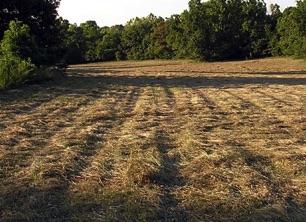The Real Work: Making Hay
Make hay while the sun shines. Or as it first appears in print, in John Heywood's Dialogue of the Effectual Proverbs in the English Tongue,
When the sun shineth make hay; which is to say
Take time when time cometh, lest time steal away.
And one good lesson to this purpose I pike
From the smith's forge, when th'iron is hot, strike!
Heywood's Dialogue is a tour de force, an anthology of colloquial wisdom framed as a dialogue between an elderly counselor and a young man who is deliberating whether to marry a beautiful maid or a rich widow. Here, the young man is speaking, marshalling reasons for marrying the widow without delay— i.e., before she dies and leaves her money elsewhere. The framing dialogue is not merely a witty device; it also dramatizes the loss of the concrete and particular that wisdom undergoes as it becomes proverbial. Make hay while the sun shines. Already, in 1546, Heywood's speaker employs this colloquialism in a context where we might substitute "money" for "hay" and "while there is demand" (i.e., while the widow is willing and able) for "while the sun shines."
It is no mere coincidence that the printed history of this aphorism should begin in 1546, under the pen of a minor courtier and dramatist who has been described as "a product of his time and a reflection of his environment... one of the new middle class that had raised itself into new prominence." As a follower of Sir Thomas More, "Heywood must have come under the influence of the new humanistic spirit that dominated the early sixteenth century." Make hay while the sun shines. In Heywood's Dialogue, this wisdom has already been severed from its country roots, has become instead a reflection of social forces that were just beginning to dominate, as they do today, the relationship between humanity and the rest of nature: the opportunism of the marketplace and the growing assurance of the efficacy of positivistic thought. Make hay while the sun shines. The transitive status of that imperative "make" is an emblem of the modern mind's condescension toward nature.
